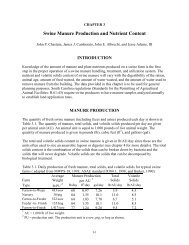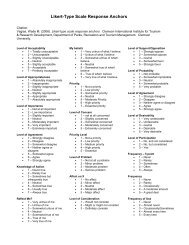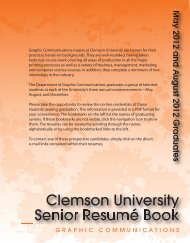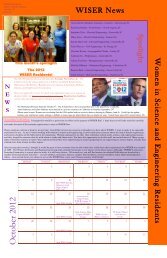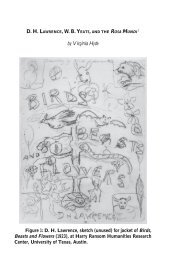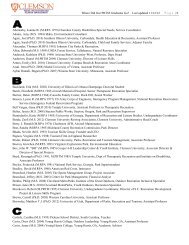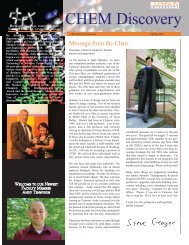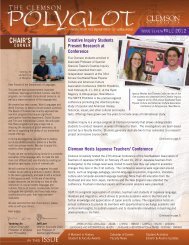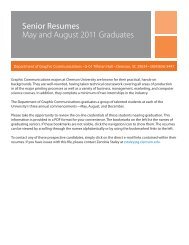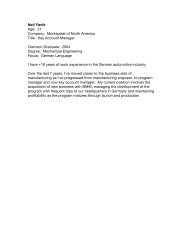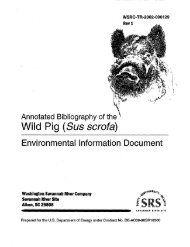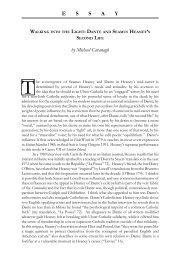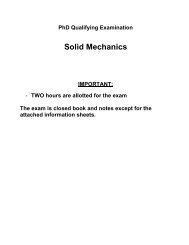Woolfian Boundaries - Clemson University
Woolfian Boundaries - Clemson University
Woolfian Boundaries - Clemson University
Create successful ePaper yourself
Turn your PDF publications into a flip-book with our unique Google optimized e-Paper software.
66 WOOLFIAN BOUNDARIES<br />
of “expert culture and specialized knowledge” and while her specifi c argument is beyond<br />
the scope of this essay, it helpfully points up a tension between modernism’s complicity<br />
with and opposition to the reorganization of these domains and the associated domains of<br />
gender and sexuality (65).<br />
While Woolf’s famous argument with the Angel in the House is set out in “Professions<br />
for Women” (1931), the nature of Lawrence’s quarrel demands some further introduction.<br />
Th e following quotation is from an unpublished fragment by Lawrence, assumed to have<br />
been written shortly before his death in 1930, providing both a useful proximity to Woolf’s<br />
essay and an interesting distance from Sons and Lovers (1913), which it seems to describe:<br />
My mother’s generation was the fi rst generation of working-class mothers to become<br />
really self-conscious…the woman freed herself at least mentally and spiritually<br />
from the husband’s domination, and then she became that great institution,<br />
that character-forming power, the mother of my generation. I am sure the<br />
character of nine-tenths of the men of my generation was formed by the mother:<br />
the character of the daughters too.<br />
…Th e woman felt herself the higher moral being: and justly, as far as economic<br />
reality goes. She therefore assumed the moral responsibility for the family, and<br />
the husband let her. So she proceeded to mould a generation. (Phoenix 818)<br />
Although Lawrence does not use the term Angel in the House, she is nevertheless<br />
recognizable in the “character-forming institution” who “assumed the moral responsibility<br />
for the family.” Lawrence’s version of the Angel in the House shares with Woolf’s renditions<br />
the fundamental characteristics of self-consciousness, self-sacrifi ce, and charactermoulding,<br />
characteristics which are unwittingly destructive of those around them, men<br />
as well as women. In Sons and Lovers, Mrs. Morel’s drive to improve her family leaves her<br />
husband an empty “husk” (62), her fi rst son William dead, and her youngest son, Paul,<br />
struggling against a death-wish. In To the Lighthouse, although Mrs. Ramsay seems to be<br />
dominated by her husband, she nonetheless infantilizes him, while her domesticating<br />
drive results in a sham marriage for the Rayleys and a premature death in childbirth for<br />
her daughter, Prue. And yet, while both novels kill their Angel/demon, neither fi nally<br />
condemns the woman herself: what is actually contested is the institution of heterosexual<br />
marriage and particularly the institution of motherhood. Lawrence’s repeated attacks on<br />
the “magna mater” are usually interpreted as misogynistic, although they also bear some<br />
resemblance to Luce Irigaray’s critique of the ideology of motherhood, whereby “‘Femininity’<br />
fades away before maternity, is absorbed into maternity” and “the mother once<br />
again…masks the woman” (Speculum 74,117).<br />
In contrast to the outward self-denial of the mother fi gures in Sons and Lovers and<br />
To the Lighthouse, both novels reveal an inner essence of being which could access a very<br />
diff erent life than that of duty and social convention followed by Mrs. Morel and Mrs.<br />
Ramsay: what Woolf describes as “a wedge-shaped core of darkness” which “could go anywhere,<br />
for no one saw it” (TTL 69). And yet this potential transcendence of the physical<br />
body is problematic for sex and gender identities, as a comparison of two passages from<br />
the novels will illustrate. In the fi rst passage, from the opening chapter of Sons and Lovers,<br />
a pregnant Mrs. Morel has been locked out of the house during a bitter argument with



